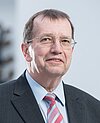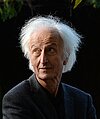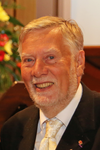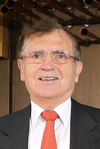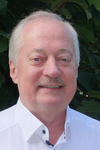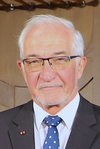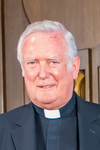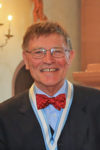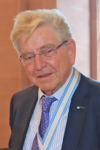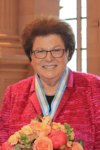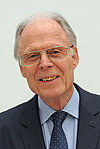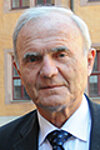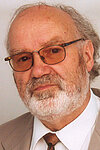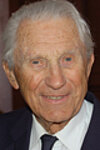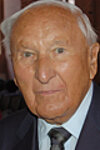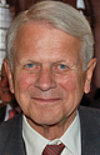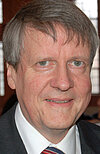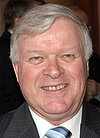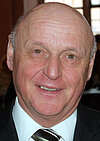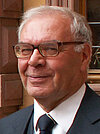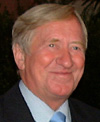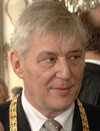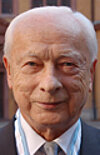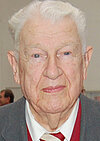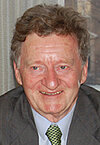Honorary Senators
Honorary Senators
The title of Honorary Senator is the highest distinction bestowed by the University of Würzburg. Figures in brackets indicate the year the title was awarded.
Prof. Dr. Dr. h.c. mult. Alfred Forchel (2022)
In 1990, Alfred Forchel accepted the appointment to the Chair of Technical Physics at the University of Würzburg. In 1994 he took over the management of the Microstructure Laboratory, which he held until 2009. He is one of the originators of the new course in nanostructure technology established in the winter semester 2000/01, the first engineering science course at JMU, and one of the initiators of the Wilhelm Conrad Röntgen Research Center for Complex Material Systems (RCCM), of which he was director from 2007 to 2021. From 2007 to 2009, Alfred Forchel was chairman of the Senate before being elected president of the university by the JMU University Council in 2009. In 2015, he was confirmed for another term until he retired from this position in 2021 due to age. Beyond retirement, he has since served as a senior professor in the Faculty of Physics and Astronomy. Alfred Forchel's achievements have been recognized with numerous awards nationally and internationally. With great vision and the highest personal commitment, Alfred Forchel strategically developed JMU. A particular focus was on promoting the acquisition of third-party funding in all disciplines. Particular highlights include JMU's success in attracting the collaborative cluster of excellence "Complexity and Topology in Quantum Materials - ct.qmat". A milestone in JMU's further development also lay in the reconstruction of the Hubland North University Campus, which opened in 2011. In addition, his focus was on improving the framework conditions for studying and teaching. In 2018, JMU became the first Bavarian university to receive system accreditation.
Prof. Dr. Dr. h.c. mult. Helmut Schwarz (2022)
Helmut Schwarz conducts research in the field of molecular chemistry. He is an expert in organometallic chemistry, especially for transition metals that are able to selectively activate bonds in organic molecules in the gas phase. This research makes an important contribution to the understanding of catalysts and catalytic processes. He also played a major role in developing the analytical method of mass spectrometry, which is widely used today. He has received a large number of research awards for his scientific achievements. From 2019 to 2021, Helmut Schwarz took on the honorable and difficult task as Chairman of the University Council of JMU. With his immense expertise, he has provided the University of Würzburg with important impulses for research and development. With his foresight, he has made a significant contribution to equipping JMU for the future.
Prof. Dr. Ekhard Salje (2020)
In October 2011, Ekhard Salje became a member of the University Council of Julius Maximilian University. In the years 2015 to 2019, he took over its chairmanship. He filled this office with great foresight and high personal commitment.
Ekhard Salje was particularly committed to the establishment of the "Siebold-Collegium. Institute for Advanced Studies (SCIAS)" at JMU and enriched its conception with valuable ideas.
Baldwin Knauf (2020)
Baldwin Knauf was involved in the University Council of Julius Maximilians University from 2011 to 2019. As a member of the Board of Trustees of JMU since 2019, he has always shown extraordinary commitment to the well-being of the Alma Julia. Scientific progress and a close exchange between business and science are particularly close to Baldwin Knauf's heart. He has been committed to promising research projects for many years. At Alma Julia, for example, he supports ambitious projects in the fields of infection research and cancer immunotherapy. Since 2010, he has set another sign of his close ties with the University of Würzburg with the symposium "Fascination Research". Since 2011, Baldwin Knauf has supported outstanding students at JMU as part of the German Scholarship Program initiated by the German government. He also supports other projects and events at the university in a variety of ways, such as the inclusive "No Limits!" sports festival.
Prof. Dr. Axel Haase (2020)
Axel Haase was appointed to the chair of Experimental Physics V (Biophysics) at Julius Maximilians University (JMU) in 1989.
He was president of JMU from 2003 to 2009. The development of the Alma Julia was decisively shaped during his presidency. The first phase of his tenure was characterized primarily by the development and implementation of an optimization concept to sharpen the profile of the University of Würzburg. In his second phase in office, he took the initiative to expand the university after the withdrawal of the American forces. In a joint effort by the state government, members of the regional parliament, the government of Lower Franconia, the city and building authorities, the Free State acquired what is now the Hubland North area for the Alma Julia (2009). It was also possible to generate a considerable investment sum for the first conversion phase.
Dr. Paul Beinhofer (2020)
Paul Beinhofer, to whom science and research have always been of great concern, has not only distinguished himself as a great supporter of the Julius Maximilians University. He also stood up for the entire region as a science location. The establishment of several non-university research institutions, for example, is a notable success. The construction and expansion projects of the Alma Julia have also always received his full support. As a member of the Board of Trustees of JMU, Paul Beinhofer also advised the university in many ways and supported it with great commitment. In addition, as chairman of the Lower Franconian Memorial Foundation for Science, he was involved in the annual awarding of outstanding doctoral theses together with the University of Würzburg.
Bischof em. Dr. Friedhelm Hofmann (2020)
Friedhelm Hofmann has been a member of the Julius Maximilians University Board of Trustees since 2013. In this office, he showed great commitment and supported the university in many ways. It is largely thanks to him that JMU has been able to use premises on the property of the Congregation of the Sisters of the Redeemer in Würzburg since the winter semester 2019/20. In the period after World War II, the chairs and facilities of the Faculty of Catholic Theology were spread across several properties. Through Friedhelm Hofmann's tireless commitment, these could be reunited close to the Old University and the Neubaukirche. Furthermore, Friedhelm Hofmann made a sustained effort to finance the endowed chair of Missiology and Dialogue of Religions.
Eberhard Sinner (2019)
The development of Bavaria as a center of science, and of Würzburg in particular, was a special concern of Eberhard Sinner. During his time in office, for example, he rendered outstanding services to the establishment of non-university research institutes.
Prior to the withdrawal of the U.S. Army from the Leighton Barracks on Hubland in the fall of 2008, he was a very committed member of the "Round Table" chaired by him and Dr. Thomas Goppel, and spoke out clearly in favor of the planned expansion of the university campus on the former barracks site. In a joint show of strength by members of the state parliament in the region, the government of Lower Franconia, the city and building authorities together with the Free State and the university, Eberhard Sinner played a very decisive role in making the university's building and expansion plans possible, in implementing them and thus in sustainably strengthening JMU's future viability.
It is thanks to Eberhard Sinner's extraordinary commitment and personal dedication that the Free State of Bavaria has acquired the Hubland North Campus for the Julius Maximilians University, which has been used successfully and with great external impact since its opening in April 2011 and is being continuously expanded.
Thomas Goppel (2019)
Expansion, renovation and renewal of the universities in Bavaria were central political goals of Thomas Goppel, to which he dedicated himself with great personal commitment in the ministry and directly on site. For example, he played a key role in supporting and assisting with numerous construction and renovation projects on the Würzburg University Hospital campus, such as the construction of the Center for Internal Medicine or the conversion of the old surgery building into a state-of-the-art biomedical research center, which today houses the Rudolf Virchow Center and the Institute for Molecular Infection Biology, among others. The sports center at Hubland, which opened in 2004, also represented a forward-looking expansion of the university campus in which he was involved.
Thomas Goppel's outstanding support for the conversion of the former Leighton Barracks site laid the foundation for the decision to acquire the Hubland North campus in a special way: a forward-looking decision that could finally be implemented in a joint effort with the government of Lower Franconia, the city and building authorities.
The Bavarian state government's decision to buy around 40 hectares of military land from the federal government and make the site available to the University of Würzburg was a milestone for JMU that will long remain essential for its future as an internationally visible, modern and high-performing university.
Barbara Stamm (2019)
For many years, Barbara Stamm helped shape the fortunes of Julius Maximilian University (JMU) Würzburg with great personal commitment. As a member of the university's Board of Trustees, she always accompanied and supported JMU's concerns and projects with admirable skill, great goodwill and foresight. In 2009, for example, she played a decisive role in making possible the expansion of the university campus on Hubland as part of the conversion process. In particular, Barbara Stamm made decisive contributions to the establishment of a non-university research institute, the Helmholtz Institute for RNA-based Infection Research (HIRI).
As a prominent supporter, Barbara Stamm also contributes in an invaluable way to numerous university projects, for example as honorary president of the "Forschung hilft" foundation of the "Hilfe im Kampf gegen Krebs e.V." association and as patron for the 400th anniversary year of our university library. Within the framework of the "Elterninitiative leukämie- und tumorkranker Kinder Würzburg e.V." (Parents' Initiative for Children with Leukemia and Tumors in Würzburg) and the Interessengemeinschaft zur Förderung der Kinder der Würzburger Intensivstation e.V. (KIWI) (Interest Group for the Support of Children in the Würzburg Intensive Care Unit), she is impressively committed to helping those affected and their relatives, including the provision of clinic-related housing for family members during therapy.
Particularly in the area of the university hospital, Barbara Stamm has moved and sustainably promoted many things for JMU, for example the German Center for Heart Failure (DZHI) or the Comprehensive Cancer Center (CCC) as well as numerous construction measures for the further optimization of clinical care and infrastructure.
Prof. Dr. Dr. h.c. Volker ter Meulen (2018)
After several research stays in the US Volker ter Meulen became department manager for clinical virology in 1971, and one year later an extraordinary professor at the JMU Würzburg. In 1975, he was appointed as an ordinary professor of clinical virology and immunology at the Institute of Virology, which he chaired until his retirement in 2003. He is the leading pioneer of moleculobiological virology and neurovirology. As a member and honorary member of various academies of science and associations he influenced the German as well as the international research community. Uncountable awards, e.g. the Max Planck Research Award, the Ernst Jung Medal for Medicine and the golden Robert Koch Medal as well as several Crosses and Orders of Merit of the Federal Republic of Germany and of the Free State of Bavaria, appreciate his commitment. The JMU honored his long-time, extraordinary commitment with the golden “Bene-Merenti”-Medal and the Rinecker Medal of the Medical Faculty.
Prof. Dr. Otmar Issing (2016)
Otmar Issing was professor at the University of Erlangen-Nuremberg from 1966 and director of the Institute for International Economic Relations. In 1973, he moved to the Chair of Economics, Money and International Economic Relations at the University of Würzburg, which he held until 1990. In 1990, he assumed the position of Chief Economist on the Executive Board of the Deutsche Bundesbank. From 1998 to 2006, Issing was a member of the Executive Board of the European Central Bank, responsible for the Directorate General of Economics and Economic Research. He helped shape the fortunes of the University of Würzburg as a member of the University Council and later the University Council from 2004 to 2015.
Prof. Dietmar Willoweit (2013)
Dietmar Willoweit held the Chair of German History of Law, Civil Law and Canon Law at the University of Würzburg for 20 years and was President of the Bavarian Academy of Sciences and Humanities for five years. Willoweit's research focuses on the influence of the concept of law on the processes of state-building since the High Middle Ages and on related problem areas. These include the development of public criminal law in the Late Middle Ages and early modern period as well as the legal status of Jews in the Middle Ages.
Prof. Dr. Siegfried Hünig (2011)
Siegfried Hünig was Professor of Organic Chemistry from 1961 to 1988. During his time at the University, as the last Director of the then Institute of Chemistry, he took on the task of organising its transformation into the Institutes of Inorganic and Organic Chemistry. He also had to plan the new Chemistry Centre at Hubland Campus as this had outgrown its premises on Röntgenring.
Prof. Dr. Ernst Helmreich (2011)
Professor of Physiological Chemistry from 1968 until his retirement in 1990. During his time at the University he built up the Physiological Chemistry Department and led it to academic success both nationally and internationally. From the early 1970s onwards, he and biochemist Professor Guido Hartmann also designed and ultimately realised the University's Biocentre.
Prof. Dr. Kurt Kochsiek (2010)
Professor of Internal Medicine and Head of the Medical Clinic from 1980 until his retirement in 1998. During his time at the University he established Cardio-Vascular Research and its collaboration with Physics in NMR imaging. This arrangement was the reason why Würzburg is leading the field in cardio-vascular research in Germany. This achievement was also founded on a successful appointment policy, which Kurt Kochsiek, as Dean of the Faculty of Medicine (1989-1991) and as Medical Director (1994-1997) of the University Clinic, helped significantly to shape.
Prof. Dr. Jörg Hacker (2009)
His work for the University of Würzburg began in the position of Professor of Microbiology from 1986 to 2008, then, in 1993, he was appointed to the Chair of Molecular Infection Biology. In this capacity, he also was the Speaker of the Research Center for Infectious Diseases and the Coordinator of the EuroPathoGenoMics excellence network promoted by the European Union. From 2008 to 2010, he was the President of the Robert Koch Institute at Berlin. Since 2010, Hacker has been the President of the Deutsche Akademie der Naturforscher Leopoldina (German national academy of sciences).
Prof. Dr. Walter Eykmann (2009)
A member of the Bavarian Parliament from 1978 to 2008, he served on the Committee on Cultural and Educational Policy up until 1998 and as the Chairman of the Committee on Public Service Issues since 1986. It is due to his efforts that the University was able to establish technological degree programmes and that it was endowed with the groundbreaking first professorship for Secondary Education Pedagogy in Bavaria in 2005. In 2002, he was appointed Honorary Professor of the University of Würzburg (Chair of General Education Studies).
Manfred Ach (2009)
Member of the Bavarian Parliament from 1994 to 2008, serving as the Chairman of the Committee on the State Budget and Financial Issues. In this capacity, he always remained a loyal and unconditional supporter in the funding of the University's major construction projects.
Prof. Dr. Dieter Salch (2007)
Honorary Professor of Tax and Company Law since 2001. Member of the Associative Council of the Universitätsbund since 1990, Member of the Board since 1997. In 1991, Salch established a foundation in the context of the Universitätsbund, with the goal of promoting research and teaching, especially in the Faculty of Law. In 1999, he was appointed to the University Council, serving as Deputy Chairman for several years, before eventually becoming Chairman of this body.
Prof. Dr. Theodor Berchem (2004)
President of the University of Würzburg from 1975 to 2003. His term of office brought about a number of decisions that led to Würzburg's rise into the top bracket of German universities. He initiated well-directed structural changes in order to enhance the strengths of the University. Among other measures, he introduced application-oriented degree programmes, promoted international cooperation, and expanded the collaboration with business companies.
Rosemarie Preh (2001)
Patron of the Universitätsbund and Preh Foundation. In 1990, she was appointed Honorary Citizen of the University of Würzburg for her merits in supporting research and teaching at Alma Julia. Rosemarie Preh was also honoured with the Bundesverdienstkreuz am Bande and the Bayerischer Verdienstorden (Orders of Merit awarded by the Federal Republic of Germany and the Free State of Bavaria respectively).
Prof. Dr. Paul-Werner Scheele (2000)
Bishop of Würzburg from 1979 to 2003, for his close ties to Julius-Maximilians University, especially to the Faculty of Catholic Theology, and for his services to ecumenism and his merits as a scholar.
Dr. Franz Vogt (2000)
President of the Government of Lower Franconia from 1984 to 2000. In his activities on behalf of the University, he particularly supported the introduction of degree programmes in engineering.
Dr. Herbert Brause (1995)
Honorary Doctor of the University of Würzburg (1980) and its constant patron. In 1976, he accepted a lectureship in School Education, which he also used to pass on his technical media expertise. In 1986, he established the foundation that bears his name, which, among other goals, promotes media education. The foundation has funded, for instance, the purchase of multi-media equipment at the ENT Clinic and the construction of the Language and Media Education Centres (ZfS and ZfM) on Hubland Campus.
Arnold Heimberger (1993)
Legal Adviser to the University of Würzburg from 1948 to 1978, Permanent Deputy of the Chancellor after 1969, he was honoured for his commitment to the resumption and further development of University activities after the devastation of the City of Würzburg in March 1945.
Dr. Michael Klett (1992)
Chairman of the Board of Klett AG (Stuttgart). The Klett publishing house has had close ties to the University since 1970, when it funded the first language laboratory. Michael Klett is committed to the University's goal of closing the rift between medicine/natural science and the humanities, especially in his capacity as co-organiser of the Würzburg Symposiums.
Dr.-Ing. Werner H. Dieter (1990)
CEO of former Mannesmann Rexroth GmbH (Lohr/Main) since 1972, CEO of Mannesmann AG (Düsseldorf) since 1985, President of the Würzburg-Schweinfurt Chamber of Industry and Commerce from 1979 to 1982. He was instrumental in intensifying the exchange between the University and Lower Franconian business companies and promoted the CIC business donation on the occasion of the University's 400-year anniversary in 1982.
Dr. phil. h.c. Otto Schäfer (1912-2000), appointed in 1990, Member of the Board of the Universitätsbund Würzburg, Schweinfurt.
Baron Richard von Swaine (1901-1994), appointed in 1990, Member of the Board of the Universitätsbund Würzburg, Schweinfurt.
Albrecht Fürst zu Castell-Castell (1925-2016), appointed in 1984, for his services to the University as Chairman of the Universitätsbund for many years.
Dr. iur. et rer. pol. Rudolf Maron*, appointed in 1978
Heinz Günder (1904-1972), appointed in 1967, District President of Lower Franconia.
Gunnar Wester*, appointed 1967, Consul of Sweden, Chairman of the Management Board of SKF Schweinfurt.
Hellmut Metzing (1919-1999), appointed in 1964, Honorary Consul of Guatemala, owner of Zeidler und Wimmer, Kirchheim.
Dr. Werner Premauer (1912-1996), appointed 1962, member of the board of Bayer. Vereinsbank, Munich-Geiselgasteig.
Dr. Franz Steffen*, appointed in 1962, member of the Board of Management of Bayer. Vereinsbank, Munich.
Kurt Schuster*, appointed in 1961, Director, Rottach-Egern
Dr. Hanns Seidel (1901-1961), appointed 1959, Bayer. Minister President, Munich.
![Josef Kern. Foto: privat [Translate to Englisch:] Josef Kern. Foto: privat 1975](/fileadmin/_processed_/1/f/csm_Josef_Kern_1975_privat_von_Sohn_ueberlassen_675786f028.jpg)
Josef Kern (1906-1985), appointed in 1959
Director of Überlandwerk Unterfranken AG, Würzburg.
Dr. phil. h.c. Otto Schäfer (1990), Member of the Associative Council of the Universitätsbund Würzburg, Schweinfurt.
Freiherr Richard von Swaine (1990), Member of the Associative Council of the Universitätsbund Würzburg, Schweinfurt.
Albrecht Fürst zu Castell-Castell (1984), for his services to the University as long-term Chairman of the Universitätsbund.
Dr. iur. et rer. pol. Rudolf Maron (1978)
Heinz Günder (1967), President of the Government of Lower Franconia.
Gunnar Wester (1967), Consul of Sweden, CEO of SKF Schweinfurt.
Hellmut Metzing (1964), Consul of Guatemala, Proprietor of Zeidler und Wimmer, Kirchheim.
Dr. Werner Premauer (1962), Member of the Board of Directors of Bayerische Vereinsbank, Munich-Geiselgasteig.
Dr. Franz Steffen (1962), Member of the Board of Directors of Bayerische Vereinsbank, Munich.
Kurt Schuster (1961), Director, Rottach-Egern.
Dr. Hans Seidel (1959), Ministerpräsident of Bavaria, Munich.
Josef Kern (1959), Director of Überlandwerk Unterfranken AG, Würzburg.
Dr.-Ing. e.h. Georg Schäfer (1958), Co-proprietor of Kugelfischer, Georg Schäfer & Co., Schweinfurt.
Dr.-Ing. e.h. Karl Wilhelm Peterson (1957), Managing Director of SKF Kugellagerfabrik GmbH, Schweinfurt.
Dr. Franz Stadelmayer (1956), Mayor, Managing Director of Bayerischer Rundfunk, Würzburg.
Anton Gastreich (1955), Proprietor of Richter & Frenzel, Würzburg.
Dipl.-Ing. Josef Riepl (1955), Proprietor of construction company Josef Riepl, Munich.
Dr. Gotthold Wahl (1954), Director of Landesversicherungsanstalt Unterfranken, Würzburg.
Dr.-Ing. Friedrich Noell (1952), Kommerzienrat (commercial counsellor), Würzburg.
Prof. Dr. med. Dr. med. h.c. Fritz König (1951), Geheimer Medizinalrat (privy medical counsellor), Würzburg.
Prof. Dr. phil. Dr. rer. nat. Dr. med. h.c. Georg Rost (1950), Geheimer Regierungsrat (privy counsellor), Würzburg.
Prof. Dr. phil. Josef Martin (1949)
Jakob Preh (1942), Factory Proprietor, Würzburg.
Prof. Dr. Rudolf Denig (1938)
Rudolf Leonhardt (1933), Kommerzienrat (commercial counsellor), Würzburg.
Dr. med. h.c. Hans Löffler (1932), Mayor, Würzburg.
Dr. med. h.c. Dr. phil. h.c. Ferdinand Springer (1921), Berlin.
Georg Karl Völk (1929), Kommerzienrat (commercial counsellor) Würzburg.
Dr. iur. h.c. Julius Ritter von Henle (1929), President of the Government of Lower Franconia, Würzburg.
Dr. Josef Schneider (1922), Ophthalmologist, Milwaukee.




![[Translate to Englisch:] Nobelpreis Röntgen Ausschnitt](/fileadmin/_processed_/8/4/csm_Nobelpreis_Ausschnitt_cbf91ddcc5.jpg)
